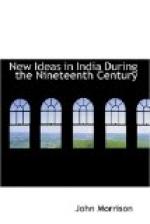[Sidenote: Several heavens and hells in popular Hinduism.]
Hindus are divided as to the existence of these temporary halting-places between the successive incarnations of the soul. The Text-book of Hindu Religion, already referred to, speaks unhesitatingly about their place in the Hindu system. The [=A]ryas, on the other hand, hold that the instant a soul leaves its body it enters another body just born. The soul is never naked—to employ a common figure. Of course in popular Hinduism it is not surprising to find not merely the ideas of Heaven and Hell, but even that each chief Deity has his own heaven and that there are various hells. In the Tantras or ritual books of modern Hinduism, there is frequent mention of such heavens and hells, and when the idea of rebirths is also met with, the rebirths are regarded as stages towards the reward or punishment of the individual conscious souls. It is the popular idea of heaven that has given rise to the common euphemism for to die, namely, to become a deva or inhabitant of heaven.
[Sidenote: Transmigration, associated with pessimism and pantheism, is likewise yielding.]
We have observed the pessimistic mood of India yielding before the improved conditions of life, and the brahmanical pantheism before the thought of God the Father. Bound up as the idea of transmigration has been with the pessimism and pantheism of India, we are prepared to find that it too is yielding. Of that we now ask what evidence there is in the ordinary speech and writings of educated India, apart from controversy or professedly Hindu writings, in which the accepted Indian orthodoxy would probably appear.
[Sidenote: Educated Hindus speak of the dead as if their former consciousness continued.]
From the ordinary speeches and writings of educated Hindus regarding the dead, no one would infer that their doctrinal standpoint was other than that of the ordinary religious Briton, namely, that the dead friend has returned to God or has been called away by God, or the like. A native judge in Bengal, one of the most distinguished leaders of the Hindu Revival, writes as follows: The beatitude which the new Radha-Krishnaites aspire to “is not the Nirvana of the Vedantists, the quiescence of Rationalism. Nirvana and quiescence are merely negatives. The beatitude [of the new Radha-Krishnaites] is a positive something. They do not aspire to unification with the divine essence. They prefer hell with its torments to such unification."[115] A few years ago, at a public meeting in Calcutta, the acknowledged leader of Hinduism, speaking of a Hindu gentleman whose death we were lamenting, said: “God has taken him to himself”—certainly not a Hindu statement of the passing of a soul. Similarly, in 1882 we find one nobleman in Bengal writing to another regarding his mother’s death: “It is my prayer to God that she may abide in eternal happiness in heaven."[116] Generations of Hindu students I have known to find pleasure in identifying themselves with Wordsworth’s views of immortality:




